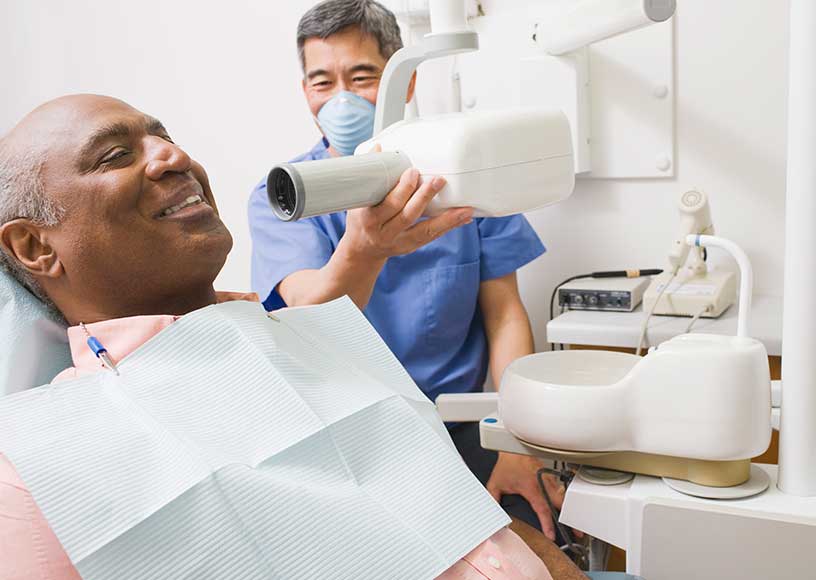6 tips to help ease dental anxiety

Going to the dentist is an important part of maintaining good oral and overall health. However, for some people, a dental visit can trigger feelings of fear and dread — which may range from mild to severe. People who feel scared about going to the dentist may have something called dental anxiety.
Those emotions may even prevent some people from going to the dentist altogether. But skipping dental visits may lead to poor oral health and may lead to bigger issues down the road.
The good news: There are positive steps to take that may help relieve the fear. Here’s what to know about dental anxiety, plus simple strategies to help reduce stress the next time you’re in the dentist’s chair.
What is dental anxiety?
Dental anxiety is a common condition that impacts about 15% of people worldwide.1, 2 It’s defined as the fear of dental visits and of receiving treatment.
It isn’t just kids that have dental worries, says Sneha Mohan, D.M.D.3 Adults of all ages may experience dental anxiety. Fear about dental visits can be especially concerning for older adults. That’s because they may have more complex oral issues that need more care.4 Common dental health problems among older adults include gum disease, cavities and dry mouth.5
The causes of dental anxiety
There are many reasons why someone might fear dentist visits. “I think it’s a combination of things. I’ve found the reason that impacts the patient the most is past experience. They may have had an upsetting experience at a young age,” explains Dr. Mohan.
The anticipation of needing more dental work may also make someone anxious, Dr. Mohan notes. “Patients will avoid the dentist to prevent knowing about any treatment, such as for cavities. I always try to tell patients the first step is coming to the dentist,” she says.
If people take good care of their teeth, including daily brushing and flossing, doing so may help reduce the need for additional dental care.6 And regular dental visits may highlight any problem areas to focus on at home. “It’s always easier to get ahead of things than to have to try and play catch-up,” says Dr. Mohan.
1. Talk to your dentist
Expressing worries with the dentist may be a good first step toward making an appointment less stressful. By telling them what you’re experiencing, it may help them form a plan to help deal with the anxiety.
Be sure to share any past negative experiences that might impact your current dental feelings. “Regardless of what happened in the past, I always try to emphasize to my patients that they are here at the dental office now,” says Dr. Mohan. Even just showing up means they’ve confronted some of their fears.
2. Agree on a stop signal
Having a simple signal may help ease anxiety. Decide on a way to let the dentist know you need a break during the treatment. It could be raising a hand or tapping the arm of the chair.6
3. Find distractions
There are certain things that help occupy the mind and body. Doing them may alleviate some stress during a dental visit. Some people find it helpful to squeeze a stress ball or use a fidget spinner.6
Another way to deflect attention from what’s happening is to visualize yourself in a happy or soothing place. That might be envisioning a calm beach or tranquil forest.6
Listening to relaxing music during a dental visit may also help decrease anxiety.7 It may even help reduce pain and discomfort.8 Ask your dentist if they have headphones for patients to use, and request soothing music. Or consider bringing wireless earbuds to listen to a curated playlist on your smartphone.
4. Practice mindfulness techniques
Deep-breathing exercises may reduce muscle tension. That’s why the American Dental Association suggests doing them in the waiting room before seeing the dentist or during breaks in the exam room.6
Count your breaths by inhaling slowly, then exhaling. Take a full breath in and out 5 times. It might help improve your mood.6
5. Book an earlier appointment
Scheduling a morning appointment reduces the time a person spends anticipating their visit. If you can get the first slot of the day, even better.
6. Bring someone for moral support
Ask a trusted friend, caregiver or loved one to come along to the appointment. Their presence may provide comfort and help take your mind off any anxious thoughts.
If you’ve ever experienced anxiety about going to the dentist, it’s important to remember that others feel the same way too. Finding calming techniques that work is a positive way to maintain good oral health. When the visit is over, plan to do something fun. Consider it a reward for making it through a dental appointment despite the fear.
